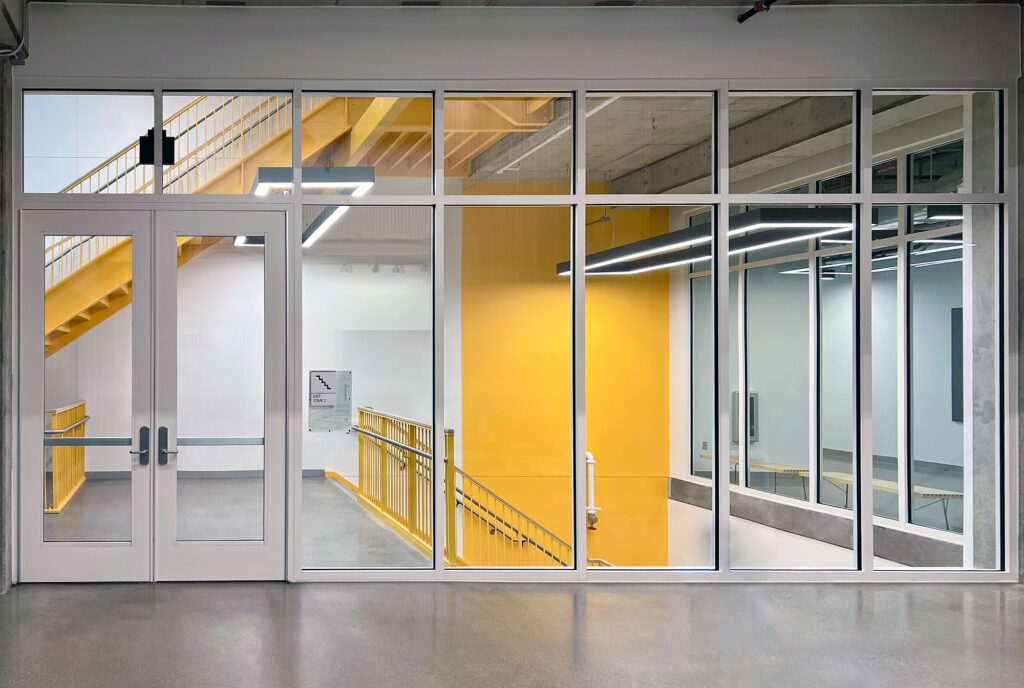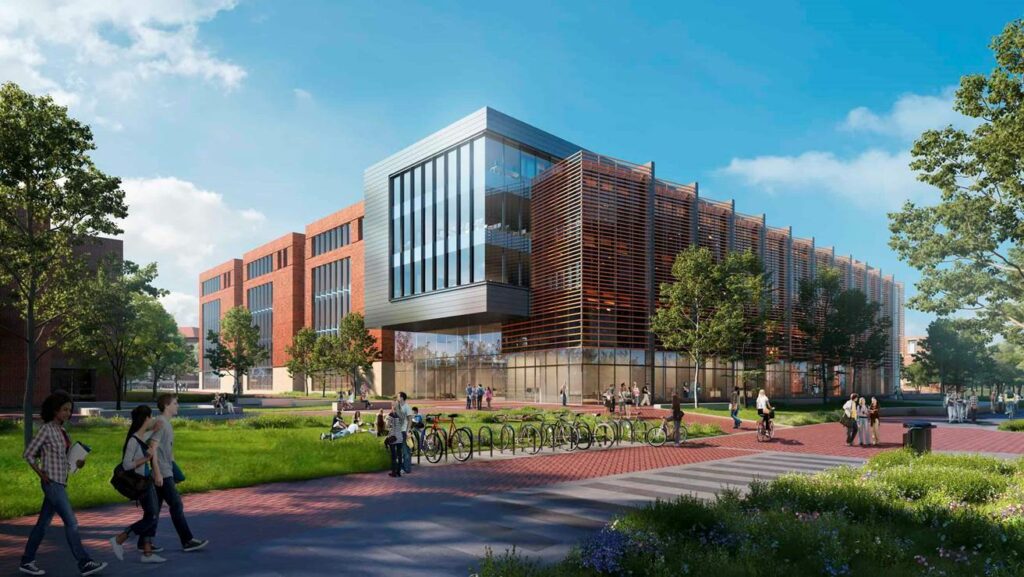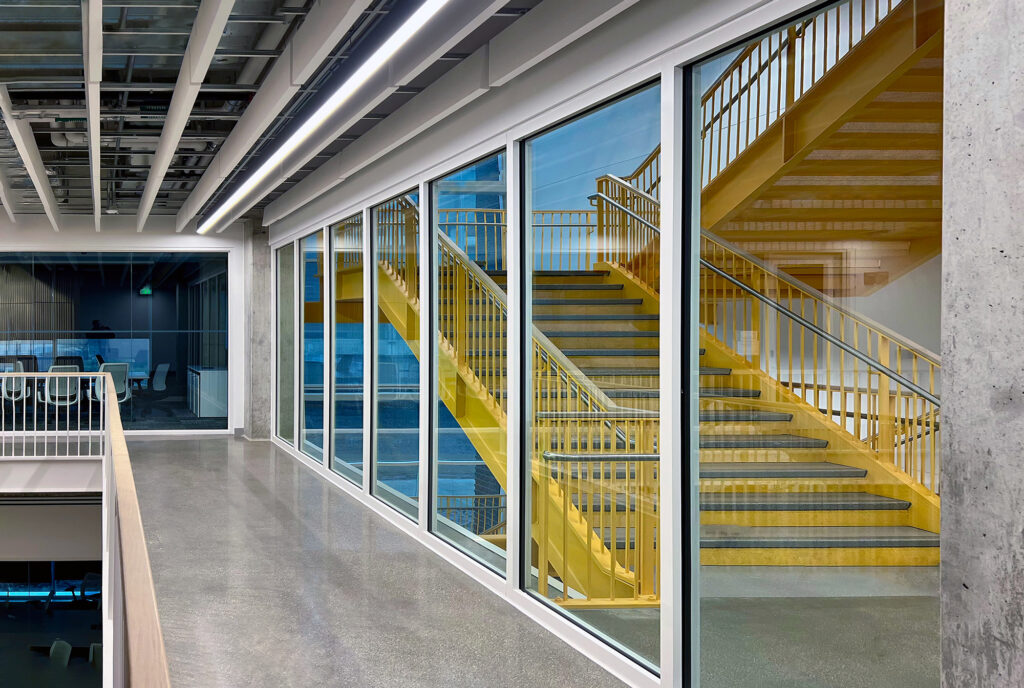
Project: Purdue University Dudley and Lambertus Halls in West Lafayette, IN
Architect: BSA LifeStructures
Construction Manager: Shiel Sexton
Glazier: Central Indiana Glass
Products used: SuperLite® II-XL 90 in GPX® Builders Series Temperature Rise Doors with Aluminum Clad and SuperLite® II-XL 120 in GPX® Architectural Series Fire Resistive Framing
In the 2023 US News & World Report Best Engineering Schools category, Purdue University ranked #4 for graduate and #9 in undergraduate programs. The consistently high rankings over the years have led to rapid growth in enrollment in Purdue’s engineering and polytechnic programs. To address this need, the university turned to BSA LifeStructures to design a new building that would accommodate the growing enrollment as well as house state-of-the-art laboratories to ensure Purdue stays on the leading edge.
BSA delivered on both fronts by designing the new Dudley and Lambertus Halls, the first facility in what would be the Purdue University Engineering and Polytechnic Gateway Complex. This new facility will replace the single-story Nuclear Engineering Building and Michael Golden Labs facilities. Dudley and Lambertus Halls is a six-story, 251,191 square foot facility with multiple labs for research, instruction and to-scale manufacturing, engineering and construction for hands-on learning. It will also have design studios, collaborative spaces and faculty offices. By bringing together multiple laboratories and resources that were once geographically separate around campus into two connected buildings, BSA was able to more than double the usable space, increase efficiencies for both the engineering and polytechnic programs and encourage more interaction between students, faculty and staff.

Because the new Dudley and Lambertus Halls will serve as the new gateway to the campus, BSA kept the brick façade that is Purdue’s predominant architectural style – but modernized it with large glass walls that allowed an abundance of natural light and vision into the building.
To allow natural light to penetrate further into the building and create transparency between spaces, glass was used throughout the interior as well – including the stairway enclosures that had to meet 2 hour fire rated code requirements.
Because stairway enclosures are means of egress, Section 1023.2 in the 2018 and 2021 IBC states that ‘interior exit stairway and ramp enclosures must have a fire resistance rating of not less than 2 hours when connecting four stories or more and not less than 1 hour where connecting less than four stories.’
Having a fire resistance rating means the assembly passes ASTM E-119 or UL 263, the fire resistive wall standard. Building materials in this category can block smoke, flames and limit the passage of radiant heat to safe levels to allow the safe egress of building occupants during a fire. Traditionally, building materials that meet ASTM E-119/UL 263 have been opaque – sheet rock, gypsum or masonry. This meant that stairway enclosures were typically dark, cold and unappealing for everyday use.
This is not the case for Purdue. Instead of opaque sheet rock, gypsum or masonry, BSA specified SAFTI FIRST’s SuperLite II-XL 120 in GPX Architectural Series Framing for the 2 hour glass walls and SuperLite II-XL 90 in GPX Builders Series Temperature Rise for the 90 minute doors to add vision and transparency to Stairs 1 and 2 from the basement level all the way to the fifth floor.

“One of the primary reasons we chose the product was to create transparency for safety and security,” says Geoff Lisle, Principal with BSA. “The natural light coming into the area allows visibility in stairwells and lets you see what’s going on.”
Chelsea Carpenter, Architectural Lead for BSA, adds “at the same time, we wanted to create openness and make the stairs inviting. The stairs are busy, so it increases the energy and level of activity of the building since you can see it from the outside. Even at night, it glows and creates a synergy in the space.”
SAFTI FIRST’s project management and production teams worked closely with Central Indiana Glass, the contract glazier for this project. Because this was a fast-moving project, SAFTI FIRST ensured that the submittals were done on time and that there were no delays in manufacturing. All the products were manufactured and shipped from SAFTI FIRST’s highly automated manufacturing facilities in Merced, CA.
# # #
